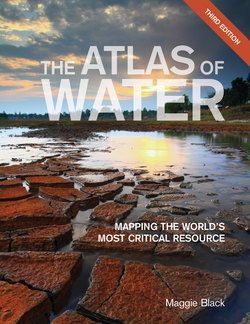Читать книгу The Atlas of Water - Maggie Black - Страница 12
На сайте Литреса книга снята с продажи.
Оглавлениеco-operation, often reinforced by water’s venerated place in human affairs. But as lifestyles become more water-intensive, and the supply is tampered with at ever greater distances, these problems become more acute, especially at the wider level of district or nation, up to multinational level. Many fear that water is becoming a commercialized commodity, with market forces left to decide who gets to use it or abuse it. Fortunately, that prospect is retreating. Irresponsible profit-making and corruption over water services – the result of inflated expectations from the privatization of services and the efficacy of markets – and the difficulties entailed in persuading customers and authorities to accept much higher pricing regimes, has induced a major re-think about optimal systems of water distribution and its management between public and private sectors. Compared to 10 or 20 years ago, there is now a much wider appreciation that water is a common good, and that it ought to be managed in the common interest by authorities that are answerable in the public domain, even though the role of the private sector has become more ubiquitous. When the task of reconciling all the different user interests is understood in all its parameters, the likelihood is that the business of “water diplomacy” among public and private practitioners will continue to be a growth industry in the 21st century. The idea of “integrated water resources management” sounds so reasonable and just – reconciling upstream and downstream users, allocating so much to agriculture and so much to industry, bringing in all parties across all political boundaries to the river basin forum – that it ought to be adopted universally and without delay. But its realization requires a complex process of reconciling competing claims, and a willingness to share a natural resource in an equitable way; therefore, such an achievement would be virtually unprecedented in human history. The omens, however, are more positive than might be thought. Despite all the talk about “water wars”, experience shows that co-operation over water has occurred more often than conflict, and that antagonists with deeply held differences in almost every sphere can manage to find common cause over water. In the end, the unjust distribution of water in the landscape may provide the stimulus for humanity to find a way of sharing this life-giving resource, and thereby further the cause of bringing humanity together to seek ways of living in peace on our much-pressurized planet. Maggie Black Oxford February 2016
13
